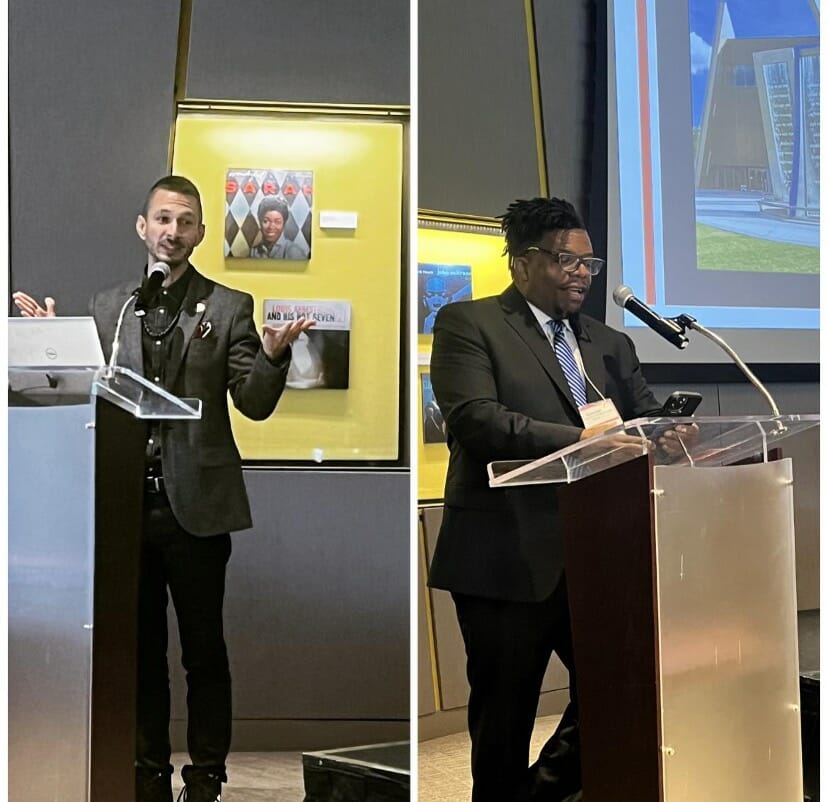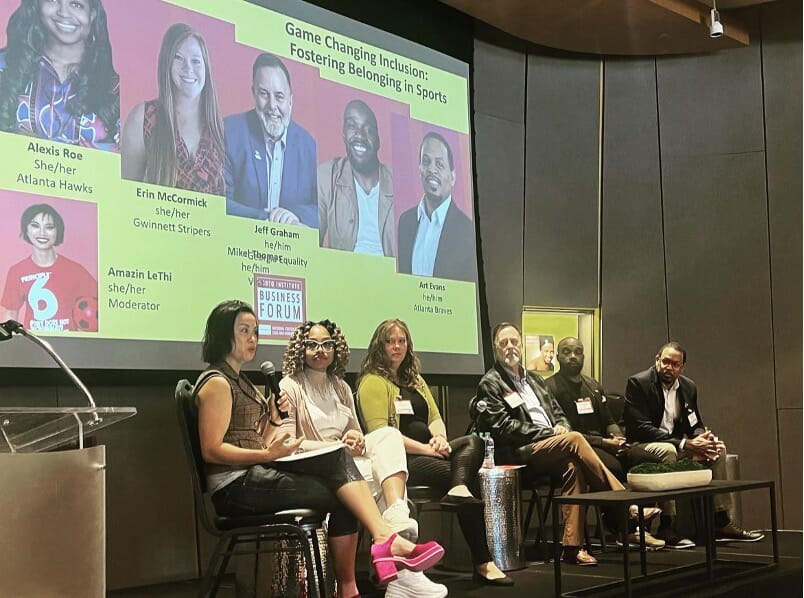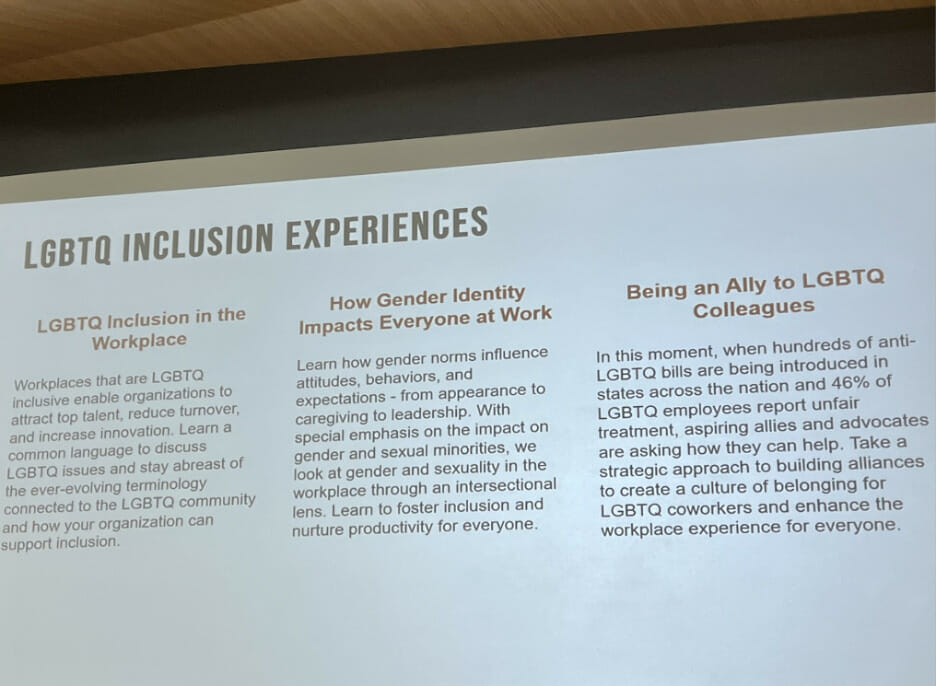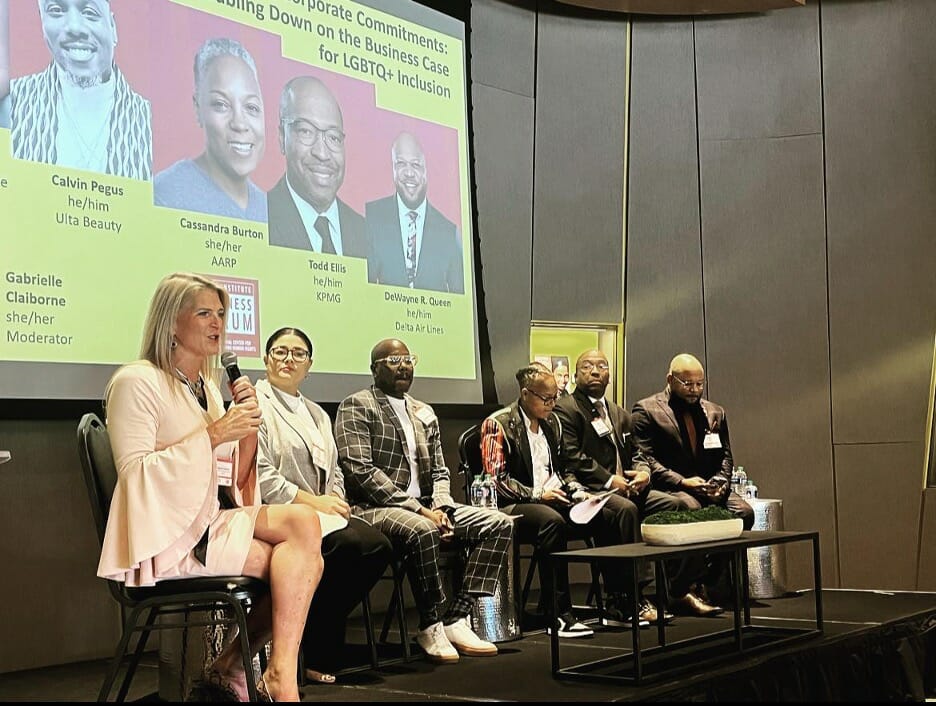“We are here today to wrestle with some hard questions,” said Tim’m T. West, Executive Director of the LGBTQ Institue at The National Center for Civil and Human Rights, during his opening address to executives, LGBTQ leaders, and other business professionals during the 2023 LGBTQ Business Forum, sponsored by Delta Airlines and UPS, on October 10th at The National Center for Civil and Human Rights in downtown Atlanta.
The LGBTQ Institute and the Center’s DEI staff assembled a diverse roster of LGBTQ leaders and allies from corporate and community-based organizations, including a keynote address delivered by Chris Lugo, Executive Director of OUT Georgia Business Alliance, to shed light on the increasing need for LGBTQ inclusion in the current political landscape. Through tabletop networking and two-panel discussions, the half-day forum examined the business case for LGBTQ inclusion in sports—and also provided panelists a platform to share personal and professional testimonials of navigating corporate LGBTQ backlash after recent PRIDE Month controversies.

Gabrielle Claiborne, CEO of Transformation Journeys Worldwide and moderator of “Cementing Corporate Commitments: Doubling Down on the Business Case for LGBTQ Inclusion,” called on corporations to be proactive by creating “courageous educational moments” for LGBTQ employees and allies ahead of any potential anti-LGBTQ animus.
“Organizations need to be more strategic and mindful around how they’re positioning themselves when they take a position on a matter that relates to an LGBTQ+ individual’s experience,” said Claiborne.
“If you have this DEI (Diversity, Equity, and Inclusion) statement and then you’re backing away when the rubber hits the road, then that’s performative,” added panelist Cassandra Burton, Consumer Insights Manager at AARP.
West, who became Executive Director of The LGBTQ Institute in January, tells GLAAD that institutions and corporations can play a critical role in humanizing people who don’t get a fair shot.
“If you call yourself an ally but haven’t been hit by stones thrown at the person you claim to care for, you aren’t standing close enough,” West said before urging corporations to go beyond participating in Pride parades and internal employee resource groups.
“I dare each of you and the organizations we represent to stand a lot closer,” he added.
A solution in search of a problem?

Amazin LeThi, an Asian-American LGBTQ advocate, athlete, Ambassador, and moderator of the “Fostering Belonging in Sports” panel, spoke to the adverse outcomes of excluding LGBTQ youth, specifically trans youth, from participating in sports.
“Sport is a basic human right. And every child should have access,” said Lethi. “And for many LGBTQ kids, sports is where they see themselves for the first time. This is where they find belonging.”
A competitive bodybuilder, LeThi, tells GLAAD that she learned leadership skills and developed a sense of self-worth as a queer athlete by participating in sports.
“I wouldn’t be here if it weren’t for sports,” she said. “For so many trans and nonbinary kids, it’s the one thing that keeps them alive. If you take away their access, you’re taking away their hope for a better tomorrow.”
According to the Movement Advancement Project and Jeff Graham, Executive Director of Georgia Equality and a panelist, 23 states have passed laws banning trans youth from participating in sports. Georgia is technically not one of those states.
“This really is a solution in search of a problem,” said Graham in response to anti-trans sports bans. “We do not have an epidemic anywhere, not here in Georgia, not in the country, not around the world, of transgender athletes depriving cisgender athletes of opportunities. So, this is motivated by politics. It is motivated by anti-LGBTQ animus.”
While anti-trans sports bans primarily impact trans students at the K-12 grade levels, advocates fear the harmful legislation will extend to trans adult athletes, especially as the global community prepares for the 2024 Olympic Games.
“At the end of the day, if a nation brings home a medal, it doesn’t matter what that person identifies as,” said panelist Mikel Thomas, a three-time Olympian and Innovation and Global Digital Partnerships at Visa.
“The flag is going to be raised, and the song is going to be played. We all need to get back to what really matters.”

development modules to give organizations language and tools for advancing inclusion. (Image: Darian Aaron)
Erin McCormick, a panelist and Vice-President/General Manager of the Minor League Baseball team, the Gwinett Stripers, exemplified corporate allyship in action in the face of online outrage from anti-LGBTQ sports fans.
“Trolls will come out and say, ‘I hope it rains on your game.’ And we’d be like, you can’t get the rainbows without the rain,” McCormick said as the audience laughed.
McCormick also pointed out that anti-LGBTQ fans with the loudest voices often shout from imaginary positions of authority.
“They’d be like, ‘Oh, cancel my season tickets.’ And we’d look in our database and say, oh, we don’t see that you have tickets. Help us find your account,” McCormick said to more laughter from the audience.
Joking aside, panelists agreed that performative allyship from corporations is unwanted.
“Don’t just make your company’s logo a rainbow, but show it 365 days a year,” said Alexis Roe, panelist and Director of DEI at the Atlanta Hawks and State Farm Arena. “Create a multi-pronged approach. Bring the community in. Allow the community to speak with your executives, provide feedback, and act on it.”
“These are tough, messy, nuanced conversations that are super hard,” said West. “But super worth it if we are to preserve the best of our humanity.”
Editor’s Note: Darian Aaron is a new appointee to the Advisory Board of The LGBTQ Institute at The National Center for Civil and Human Rights.













